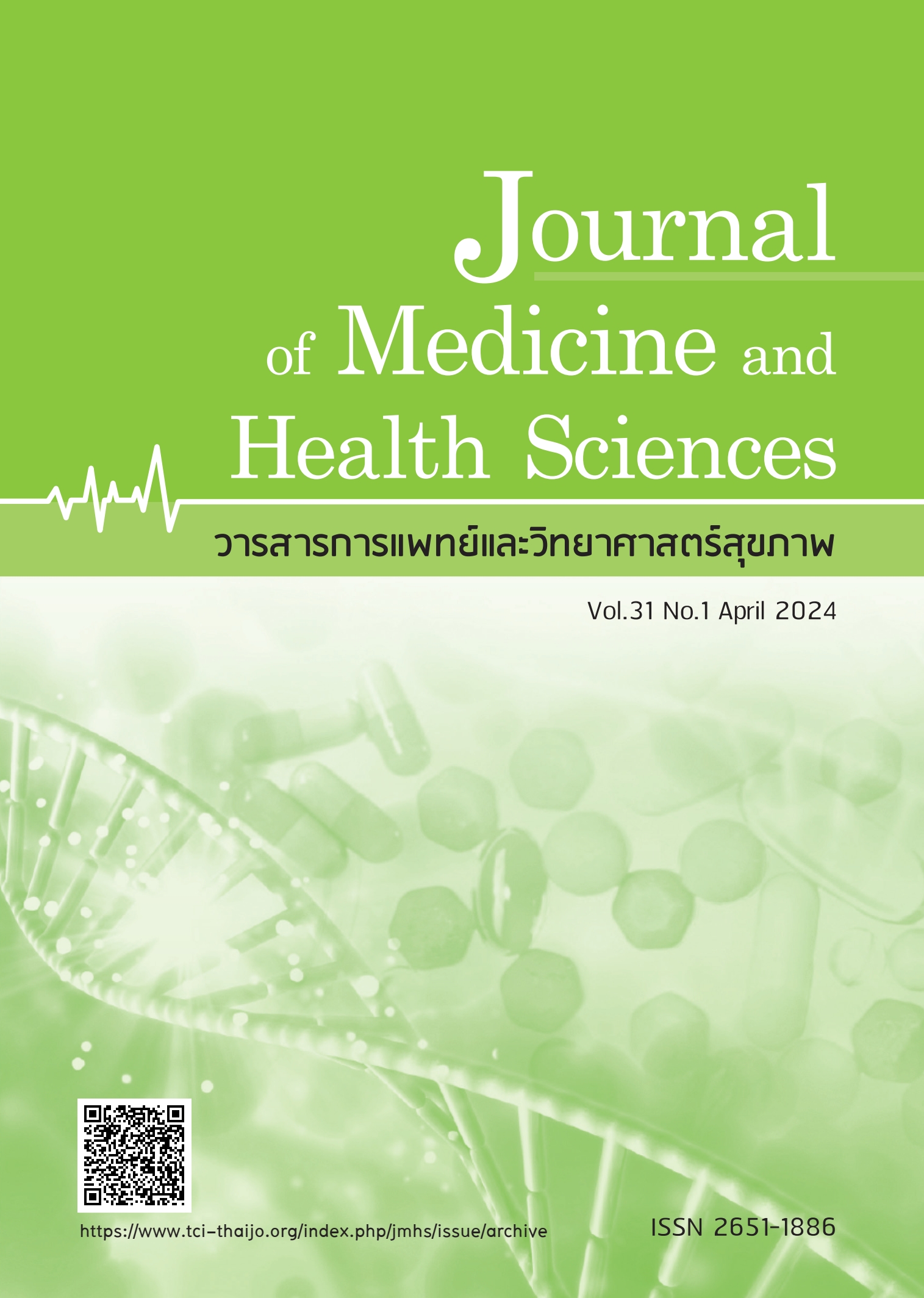Factors associated with mortality among patients admitted to King Narai Hospital due to acute upper gastrointestinal bleeding
Keywords:
Acute upper gastrointestinal bleeding, Esophageal varices, Peptic ulcers, MortalityAbstract
Acute upper gastrointestinal bleeding (UGIB) is a significant public health concern and a leading cause of death worldwide. Data from King Narai Hospital over the past 5 years reveals that the mortality rate ranged between 9-14%. This study aimed to investigate the factors associated with mortality among patients admitted to King Narai Hospital due to acute UGIB. The study group consisted of 204 individuals diagnosed with acute upper gastrointestinal bleeding between January 2023 and December 2023. The research tool used was a data recording form that included demographic and clinical data, laboratory parameters, endoscopic findings, and treatment outcomes. Data were analyzed using descriptive statistics and multiple logistic regression. The results revealed that there were 204 cases of patients with acute UGIB, with 122 patients (59.8%) being male. The median age was 61±15.06 years. A history of aspirin use was found in 30.4% of cases. Most patients presented with melena, accounting for 110 cases (53.9%), while hematemesis was found in a total of 94 cases (46.1%). Mortality occurred in 35 cases (17.15%). Of those who died, 51.4% had undergone esophagogastroduodenoscopy. Esophageal varices and peptic ulcers were found in 9 cases (50%) and 8 cases (44%), respectively. Significant factors associated with mortality in acute UGIB patients included a pulse rate higher than 100 beats per minute, a systolic blood pressure lower than 90 mmHg, a white blood cell count greater than 12.00x109 cells per liter, lack of access to endoscopy, and provision of more than 3 units of fresh-frozen plasma (FFP). In conclusion, esophageal varices and peptic ulcers were the main causes of death. Factors that increase the risk of mortality include a pulse rate of more than 100 beats per minute, a systolic blood pressure lower than 90 mmHg, a white blood cell count of more than 12.00x109 cells per liter, lack of access to endoscopy, and the delivery of more than 3 units of FFP.
References
Adrian J Stanley, Loren Laine. Management of acute upper gastrointestinal bleeding. BMJ 2019;364:l536.
Kerdsin S, Laohawee P, Juthathippata M, et al. Clinical risk factors of variceal or non-variceal upper gastrointestinal bleeding. BJM 2019;2:45-56. [in Thai]
Kurien M, Lobo AJ. Acute upper gastrointestinal bleeding. Clin Med (Lond) 2015;15:481-5.
Almadi MA, Almutairdi A, Alruzug IM, et al. Upper gastrointestinal bleeding: Causes and patient outcomes. Saudi J Gastroenterol 2021;27:20-7.
Bunchorntavakul C, Yodket Y, Singhasena N. Clinical characteristics, treatment outcomes and risk assessment of patients with acute upper gastrointestinal bleeding in Rajavithi hospital, Thailand. J Med Assoc Thai 2017;100 Suppl 1:S104-15.
Ahmed A, Stanley AJ. Acute upper gastrointestinal bleeding in the elderly:
aetiology, diagnosis and treatment. Drugs Aging 2012;29:933-40.
Masclee GM, Valkhoff VE, Coloma PM, et al. Risk of upper gastrointestinal bleeding from different drug combinations. Gastroenterology 2014;147:784-92.e9;quiz e13-4.
He L, Zhang J, Zhang S. Risk factors of in-hospital mortality among patients with upper gastrointestinal bleeding and acute myocardial infarction. Saudi J Gastroenterol 2018;24:177-82.
Moledina S.M., Komba E. Risk factors for mortality among patients admitted with upper gastrointestinal bleeding at a tertiary hospital: a prospective cohort study. BMC Gastroenterol 2017;17:165.
Suchartlikitwong S, Lapumnuaypol K, Rerknimitr R, et al. Epidemiology of upper gastrointestinal bleeding and Helicobacter pylori infection: review of 3,488 Thai patients. Asian Biomed 2015;9:87-93.
Anita Slomski. Daily aspirin increases gastrointestinal bleeding among older adults. JAMA 2020;324:1599.
Capet C, Czernichow P, Dupas JL, et al. Upper gastrointestinal bleeding in patients treated by low-dose aspirin. Gastroenterol Clin Biol 2001;25:233-8.
Chi TY, Zhu HM, Zhang M. Risk factors associated with nonsteroidal antiinflammatory drugs (NSAIDs)-induced gastrointestinal bleeding resulting on people over 60 years old in Beijing. Medicine (Baltimore) 2018;97:e0665.
Sostres C, Lanas A. Epidemiology and demographics of upper gastrointestinal
bleeding: prevalence, incidence, and mortality. Gastrointest Endosc Clin N Am 2011;21:567-81.
Thongsujaritkul C, Sutham K, Wittayachamnankul B, et al. Prognostic indices of upper gastrointestinal bleeding in patients in the emergency department. Chiang Mai Med J 2021;60:291-302.
Alexandrino G, Domingues TD, Carvalho R, et al. Endoscopy timing in patients with acute upper gastrointestinal bleeding. Clin Endosc 2019;52:47.
James Y.W. Lau, Yuanyuan Yu, Raymond S.Y. Tang, et al. Timing of endoscopy for acute upper gastrointestinal bleeding. N Engl J Med 2020;382:1299-308.
Nahon S, Hagège H, Latrive JP, et al. Epidemiological and prognostic factors involved in upper gastrointestinal bleeding: results of a French prospective multicenter study. Endoscopy 2012;44:998-1008.
Aljarad Z, Mobayed BB. The mortality rate among patients with acute upper GI bleeding (with/without EGD) at Aleppo university hospital: a retrospective study. Ann Med Surg (Lond) 2021;71:102958.
Liu S, Zhang X, Walline JH, et al. Fresh frozen plasma in cases of acute upper gastrointestinal bleeding does not improve outcomes. Front Med 2022;9:934024.
Jeong N, Kim KS, Jung YS, et al. Delayed endoscopy is associated with increased mortality in upper gastrointestinal hemorrhage. Am J Emerg Med 2019;37:277-80.
Chiu PW, Ng EK, Cheung FK, et al. Predicting mortality in patients with bleeding peptic ulcers after therapeutic endoscopy. Clin Gastroenterol Hepatol 2009;7:311-6;quiz253.
Rakotondrainibe A, Rahanitriniaina NMP, Randriamizao HMR, et al. Clinical mortality risk factors of variceal upper gastrointestinal bleeding in a Malagasy surgical intensive care unit. Afr J Emerg Med 2020;10:188-92.
Lisman T, Procopet B. Fresh frozen plasma in treating acute variceal bleeding: Not effective and likely harmful. Liver Int 2021;41:1710-2.
Castaneda B, Morales J, Lionetti R, et al. Effects of blood volume restitution following a portal hypertensive-related bleeding in anesthetized cirrhotic rats. Hepatology 2001;33:821-25.
Downloads
Published
How to Cite
Issue
Section
License
Copyright (c) 2024 Journal of Medicine and Health Sciences

This work is licensed under a Creative Commons Attribution-NonCommercial-NoDerivatives 4.0 International License.



